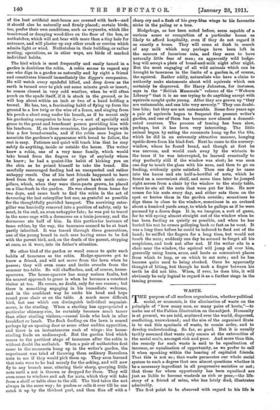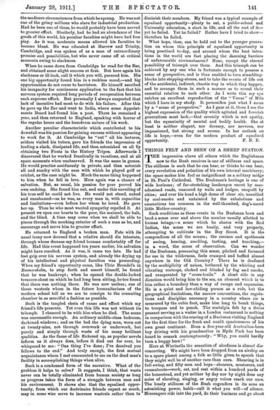WASTE.
THE purpose of all modern organisation, whether political social, or economic, is the elimination of waste on the principle of "how many men, so many pairs of boots,"—to make use of the Fabian illustration on the subject. Humanity is at present, we are told, scattered over the world, dispersed, conflicting, unawakened; and the aim of the organised State is to end this spectacle of waste, to create order, and to develop understanding. So far, so good. But it is usually tacitly assumed that waste only occurs at the extremities of the social scale, amongst rich and poor. And more than this, the remedy for such waste is said to be equalisation of incomes, or equalisation of opportunity, as we prefer to call it when speaking within the hearing of capitalist friends. That this is not so ; that waste permeates our whole social system to such a degree that one almost questions whether it be a necessary ingredient in all progressive societies or not ; that those for whom opportunity has been equalised are just as liable to become wastrels as rich or poor,—the life- story of a friend of mine, who has lately died, illustrates admirably.
The first point to be observed with regard to his life is
the mediocre circumstances from which he sprang. He was not one of the grimy millions who slave for industrial production. Had he been one of these, he would probably have been nerved to greater effort. Similarly, had he had an abundance of the goods of this world, his peculiar faculties might have had free play. As it was, moderate means allowed his faculties to become blunt He was educated at Harrow and Trinity, Cambridge, and was spoken of as a man of extraordinary promise and possibilities, but who never came off at critical moments owing to slackness.
When he came down from Cambridge he read for the Bar, and obtained some slight success at first. But here again his slackness or ill-luck, call it which you will, pursued him. His one big opportunity found him in a. reckless mood,—and big opportunities do not recur to barristers. He himself ascribed his incapacity for continuous application to the fact that his nervous system required long periods of recuperation between each supreme effort. But personally I always suspected that lack of incentive had most to do with his failure. After this he gave up the Bar and went to India, where some Appoint- ments Board had found him a post. There he remained a year, and then returned to England, speaking with horror of the regular hours and the humdrum nature of his work.
Another peculiar characteristic which contributed to his downfall was his passion for gaining success without appearing to work for it. At Cambridge he "out" all his lectures, seldom visited his tutors, gave his friends the impression of leading a slack, dissipated life, and then astonished us all liy obtaining two Firsts in the History Tripes. Afterwards I discovered that he worked frantically in vacations, and at all spare moments when unobserved. It was the same in games. He would practise assiduously in private, and then astonish all and sundry with the ease with which he played golf or cricket, as the case might be. Much the same thing happened to him when he fell in love. Here again was a chance of salvation. But, as usual, his passion for pose proved his own undoing. She found him out, and under this unveiling of his true self he could not live. He would not stand, naked and unashamed—as he was, as every man is, with capacities and limitations—even before her whom he loved. He gave her up. Thus he who most wanted sympathy repelled it. At present we open our hearts to the poor, the maimed, the halt, and the blind. A time may come when we shall be able to pierce through the mocking exterior of such a man as he, and encourage and nerve him to greater effort.
He returned to England a broken man. Fate with its usual irony now decreed that a relative should die intestate, through whose decease my friend became comfortably off for life. Had this event happened ten years earlier, his salvation might have resulted. As it was, it came too late. He had lost grip over his nervous system, and already the drying up of his intellectual and physical faculties was proceeding When my friend's opportunity came, like Ulric Brendel's in Rosmersholm, to step forth and assert himself, he found that be was bankrupt ; when he opened the double-locked treasure-chest on which he had long been sitting, he too found that there was nothing there. He was now useless ; one of those wastrels whom in the future humanitarians of the modern school tell us we are to consign to the cremating chamber in as merciful a fashion as possible.
Such is the tangled skein of cause and effect which my friend's life presents. Yet even this life was not without its triumph. I chanced to be with him when he died. The scene was unromantic enough. An ordinary middle-class bedroom, darkened windows ; and on the bed the dying man, worn out at twenty-nine, not through overwork or underwork, but purely and simply through waste of his many brilliant qualities. As the flame of life flickered up, as popular novels inform us it always does, before it died out for ever, he whispered to me: "One thing I've done ; I've deceived you fellows to the end." And truly enough, the first mutual acquaintance whom I met commented to me on the dead man's facility in accomplishing things when alive.
Such is a condensed form of the narrative. What of the problem it helps to solve P It suggests, I think, that waste never can be totally eliminated from human societry as long as progress takes the form of a struggle between man and his environment It shows also that the equalised oppor- tunity, from which our doctrinaire friends expect so much, may in some wise serve to increase wastrels rather than to diminish their numbers. My friend was a typical example of equalised opportunity—plenty to eat, a public-school and University education, a start in life, and all the rest of it— yet he failed. Yet he failed? Rather have I tried to show— therefore he failed.
What hope, then, can be held out to the younger genera- tion on whom this principle of equalised opportunity is being practised to-day, and around whom the best inten- tions in the world are fast placing the damning barriers of unfavourable circumstances ? None, except the eternal possibility of triumph over them. And this triumph can be achieved by any one who is fortunate enough to possess a sense of perspective, and is thus enabled to turn stumbling- blocks into stepping-stones, and to take the events of life out of the accidental, indirect, chaotic way in which they happen, and to arrange them in such a manner as to reveal their essential relation to each other. As I write this my eye catches an excellent reproduction of the " Venus " of Milo which I have in my study. It personifies just what I mean by a "sense of perspective." As I gaze at it, there I see the highest expression of the quality which agitated and feverish generations most lack,—that serenity which is not apathy, but the equanimity of mental and bodily health. She at least is neither elegant, nor dreamy, nor nervous, nor impassioned, but strong and serene. In her outlook on life is hope,—even for the modern product of equalised























































 Previous page
Previous page